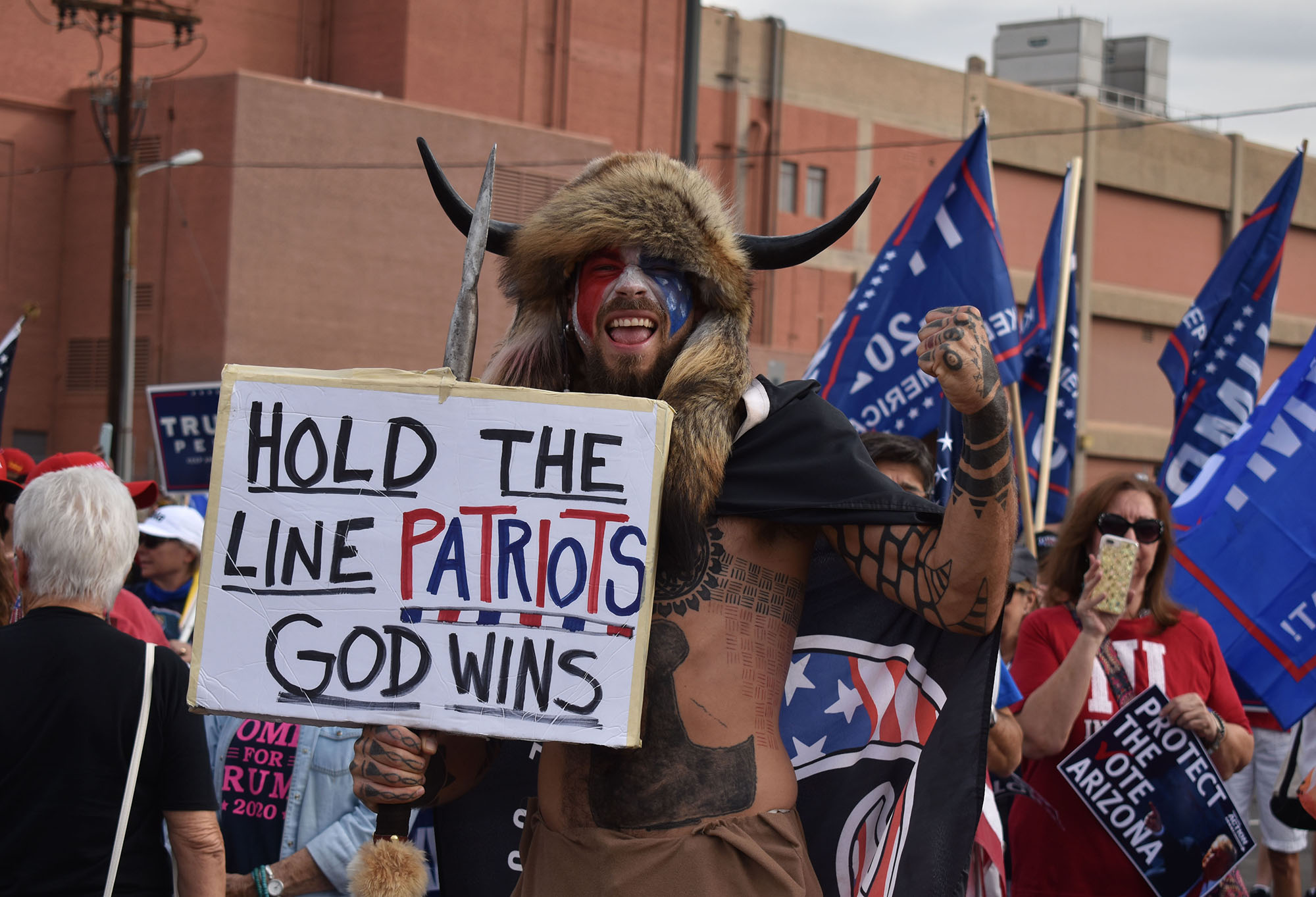When mobs stormed the Capitol on Jan. 6, Arizona resident Jacob Chansley, better known as the Q-Anon shaman, left behind a hand-written note for Vice President Mike Pence.
“It’s only a matter of time. Justice is coming.”
Chansley denied in court documents that the note was the threat prosecutors say it was. But if it was a threat against an elected official, Chansley would be far from alone.
Credible threats against lawmakers and members of Congress have risen steadily from 3,939 in 2017 to 8,613 in 2020, according to data from the U.S. Capitol Police. Those numbers spiked in 2021, with about 4,500 threats from Jan. 1 to March 31, racking up more threats in three months than in all of 2017, and putting the year on pace to double the 2020 total.
The increase comes as no surprise to experts who track the nation’s increasing political polarization.
READ ALSO: Hundreds gather outside Maricopa election center as protests continue
“We have become segregated politically in a way that is incredibly dangerous,” said Daniel A. Cox, director of the American Enterprise Institute’s Survey Center on American Life.
Thomas Mann of the Brookings Institute said the increased partisan demonization of the other side has allowed the hostility to balloon.
“It sort of legitimizes the most extreme behavior an individual citizen might take,” Mann said.
And the hostility is not just directed at Congress. The Arizona Department of Public Safety recorded 12 threats against state officials in 2019-2020, a number that jumped to 28 in 2020-2021.
“In some ways, I’ve learned to sort of block it and not take it personally,” said Arizona Secretary of State Katie Hobbs, who was the target of threats during the uproar over the 2020 elections.
Protesters showed up at Hobbs’ home in the weeks after the election, and Hobbs was assigned a security detail at one point. She said in a statement in November that while she was “prepared for these threats of violence and vitriol,” she considered it “abhorrent” that her family and staff were subjected to it.
“I’m not going to say that any elected official signs up for this when they run for office, because I think it’s terrible that we are at that point,” Hobbs said recently. “But certainly, the people that work in my office, the people that work in other election offices, are public servants and they didn’t sign up for this.”
Arizona State Sen. Paul Boyer, R-Glendale, said threats of violence sparked by the election temporarily drove him and his family from their home. Boyer became a target of abuse as the only Republican to vote against a measure calling for the arrest of the Maricopa County supervisors if they refused to honor a Senate subpoena of ballots and vote-counting machines.
“My assistant told me that just here at the Capitol I received over 5,600 voicemails, just on the vote of contempt alone,” Boyer said. “On my personal cell phone, I probably got about 9,000 text messages, about 20,000 emails, and hundreds of phone calls that I missed on my own personal cell phone.”
The backlash led DPS to recommend that Boyer change his phone number. Boyer, like Hobbs, was most distressed that his family was caught in the storm.
“All I know is my home address, where my wife works, and other personal information was put out there for the public,” he said.
The anger directed at elected officials does not come as a surprise to Cox. In a recent survey by his center, nearly 3 in 10 Americans agreed with the statement, “If elected leaders will not protect America, the people must do it themselves — even if it requires taking violent actions.”
And thousands took violent action Jan. 6, when mobs stormed the Capitol as Congress was inside certifying the election of President Joe Biden. Rep. Tom O’Halleran, D-Sedona, remembers what it was like inside the House chamber as the mob broke into the Capitol.
“As a former police officer, anxiety does not rule the day. What I have to do is calm people down and that’s exactly what I did on the floor,” O’Halleran said. “There was a lot of anxiety by people and fear which is appropriate.
“You could hear a gunshot right outside the chamber. You could start to smell the gas,” he said.
Few elected officials would discuss details of the threats against them, due to concerns over security. But O’Halleran acknowledged that he has received threats in recent months and that his team has had to be on a higher state of alert.
“I’ve had threats. One person prior to January 6, no they arrested him on January 9, but he had been somebody they had been looking for quite some time,” he said. “He’s still locked up in jail on another death threat.”
In Cox’s survey, Republicans were more likely to support resorting to violence than Democrats, by 39 percent to 17 percent. Rep. Debbie Lesko, R-Peoria, said the partisanship in Washington can be “toxic,” but that it cuts both ways.
“We have to all work together,” Lesko said. “I certainly have differences with some of my Democratic colleagues on major issues, but I think … we should all treat each other with respect.”
But Cox said those who are making the threats often feel they are not respected.
“If you think that the political landscape is tilted against you, if you think that the economic environment is inhospitable and you don’t broadly trust institutions of higher learning, the scientific community, the media, where do you go?” he asked.
Hobbs agrees that the rise in hostility is “a symptom of a bigger problem, in that the trust and confidence in our government and our democratic institution is being undermined… sometimes by those very elected officials,”
Cox said the solution is to “double down on the efforts to regain trust in them (institutions), and I think a great place to start is local institutions. But Cox said the U.S still has a long road ahead.
“We’ve got to shut down some of this rhetoric about the other side represents some maligned force in society that needs to be destroyed,” he said. “The political rhetoric has just got to be dialed down.”
Story by Jake Holter, Cronkite News




